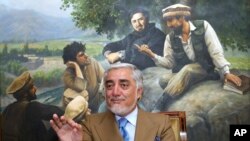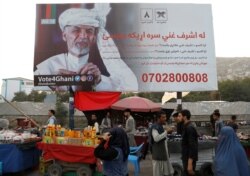Just days away from Afghanistan's presidential election, leading challenger and current Chief Executive Abdullah Abdullah alleged that the vote is threatened by widespread abuses of power by his rival, incumbent President Ashraf Ghani, during an interview with The Associated Press on Thursday.
Abdullah, who ran against Ghani five years ago in what were widely dismissed as deeply flawed polls, said he fears a skewed outcome again could threaten the country's tottering democracy.
“We have registered quite a few complaints, but this is just the tip of the iceberg,” Abdullah said, referring to his Ghani's infractions.
“My main concern will be that massively fraudulent elections ... will have an impact on the mentality of the people, on the views of the people, the democratic process, whether it is functioning or not,” he said. “If it is not functioning, what's the other way to go ahead with your goals?”
A contested election marked violence could destabilize the country. Many in Afghanistan fear heavily armed supporters of the losing candidates will turn their weapons on each other if Saturday's voting, which is notoriously flawed in Afghanistan, again seem mired in fraud.
The 2014 presidential election was so mired in fraud allegations that the United States decided a winner would not be declared. Instead, the U.S. divided power between Ghani and his leading rival, Abdullah, to form a power-sharing government.
Speaking at his heavily guarded home in the capital, Abdullah said his big worry on election day is ballot stuffing.
He looked visibly tired from a rigorous campaign that began in earnest barely two weeks ago, after a deal with the Taliban that seemed imminent was declared “dead” by President Donald Trump.
Until then, campaigning had been subdued. Many of the 18 presidential candidates not even holding events. The assumption was that any peace deal would lead to a new interim government, making the scheduled election irrelevant.
Ghani and Abdullah went into high gear after Trump's Sept. 7 announcement. Some candidates have dropped out of the race, but others might still draw votes away from one of the front-runners, blocking them from getting the 51% majority of the vote they need to win outright.
That means that even though most of the candidates who remain in the race don't have a shot at winning, they still can affect the outcome.
Abdullah and Ghani, who are the favorites to win, have crisscrossed the country, sometimes addressing two and three rallies in a single day in different parts of Afghanistan.
Campaigning ended at midnight on Wednesday, 48 hours before polls open, in keeping with Afghanistan's electoral rules.





